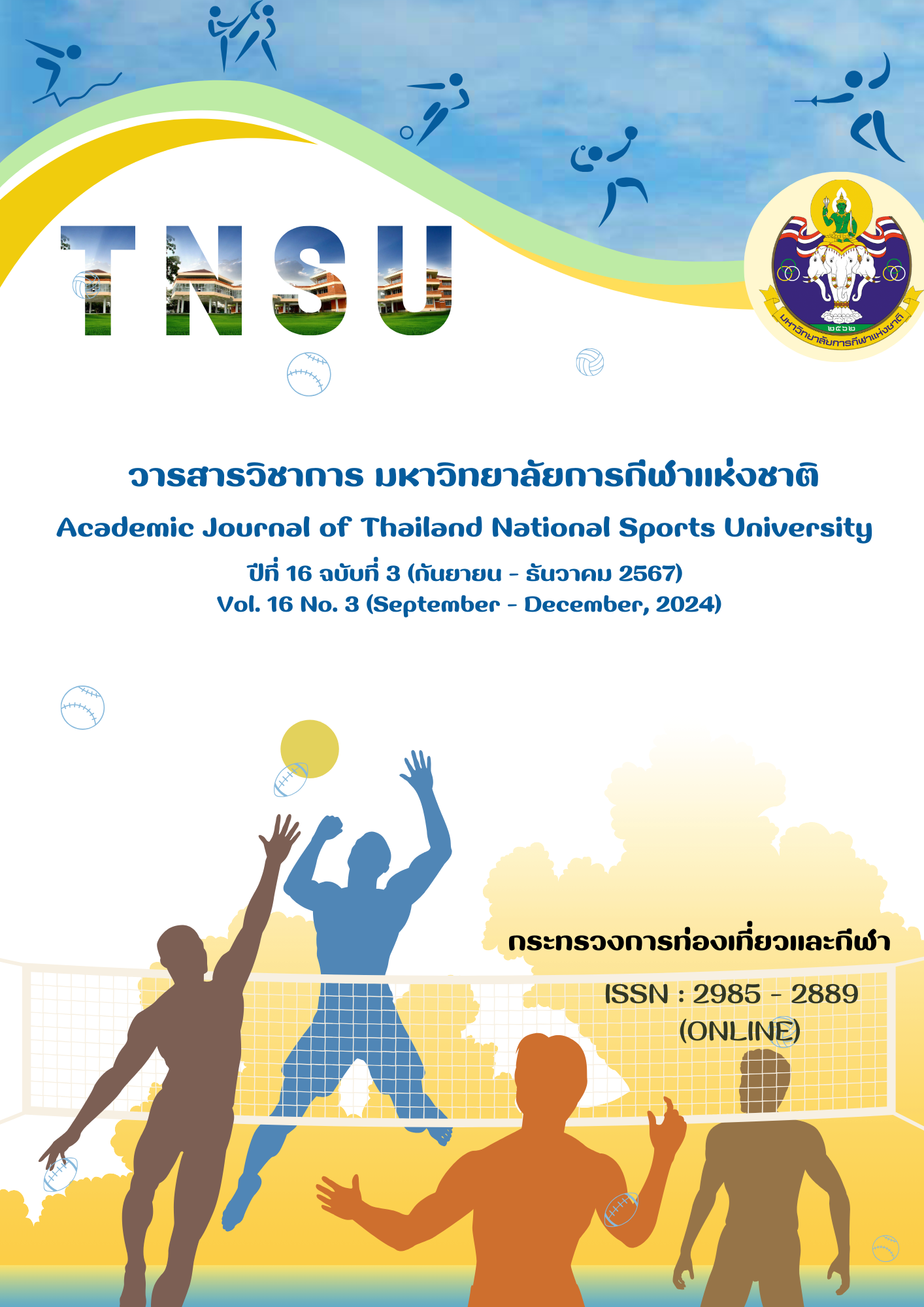SCUBA DIVING MODEL FOR PROFESSIONAL DEVELOPMENT SUSTAINABLE OF THAILAND
Main Article Content
Abstract
The research objectives were: (1) to study the operating conditions and the need for scuba diving model to develop sustainable personnel standards of Thailand from executives, entrepreneurs and scuba diving instructors, totaling 27 people using in-depth interviews, the data was analyzed using content analysis, (2) to create and develop scuba diving model to develop sustainable personnel standards of Thailand, (3) to try out scuba diving model with a group of 7 experienced scuba diving students to develop sustainable personnel standards of Thailand. The quantitative research instrument was questionnaire with reliability level and data were analyzed using basic statistics, and (4) to study the interactions of scuba diving model to develop sustainable personnel standards of Thailand among 400 stakeholders using standard and indicator interaction questionnaires. Data were analyzed using five-way ANOVA and One Sample t-test.
The results of the research showed that the model consisted of 4 standards and 41 indicators as follows: 1) Standards for scuba diving sports practice skills, 12 indicators, 2) Scuba diving management standards 9 indicators, 3) Scuba diving learner standards 8 indicators, 3) Scuba diving learner standards 8 indicators, 4) Scuba diving knowledge standard 12 indicators and the results of the preliminary experimental model found that the usefulness. at a high level ( = 4.14, S.D. = 0.66), followed by accuracy is at a high level (
= 4.07, S.D. = 0.71) and suitability is at a high level (
= 4.00, S.D. = 0.70). The results of the experiment with stakeholders showed that standards for the management of sample groups with different characteristics gave no different evaluation scores. And another 3 standards, practical skills, learners, and knowledge, found that the interaction of population characteristics variables affected the difference in assessment scores. Consider that scores against criteria (Mean score equal to 3.50) was found to be higher than the specified criteria with statistical significance at the .05 level.
Article Details

This work is licensed under a Creative Commons Attribution-NonCommercial-NoDerivatives 4.0 International License.
The published article is a copyright of the Academic Journal of Thailand National Sports University. The passage appeared in each article in this academic journal is a perspective of each author which is not related to the journal. Each author is required to be responsible for all components of his/her own article. If there are any mistakes, each author must be responsible for those mistakes on his/her own.
References
Arunee Pongphan. (2021). Promoting Scuba Diving Competency through Buddhist Dharma. Bangkok: Research Institute Chulabhorn.
Boonjai Srisathitnarakul. (2010). Influence size, power analysis, calculation of appropriate sample size using the G*Power program: Chulalongkorn Publishing House.
Buchner, A., Faul, F., Erdfelder, E., & Buchner, A. (2007). G*Power 3: A flexible statistical power analysis program for the social, behavioral, and biomedical sciences. Behavior Research Methods, 39(2), 175 - 191. Retrieved from https://link.springer.com/content/pdf/10.3758/BF03193146.pdf
Caramanna, G., & O’Brien, Ed. (2016). Risk management: A diver's perspective. American Academy of Underwater Sciences Diving for Science 2016. Woods Hole, USA.
Division of Tourism and Sports Economy. (1974). Direction of tourism promotion affected by the viral infectious disease crisis. Corona 2017. Bangkok: Ministry of Tourism and Sports.
Division of Tourism and Sports Economy. (2016). Tourism Economic Report 2016. Bangkok: Ministry of Tourism and Sports.
Division of Tourism and Sports Economy. (2021). Tourism Economic Report 2021. Bangkok: Ministry of Tourism and Sports.
Donrawee Panyaphab. (2020). Relationship between attitude and personality 5 components and attitude behavior underwater responsibility of Koh Tao Divers Koh Phangan District Surat Thani Province (Master’s thesis), Srinakharinwirot University.
Kanthida Promsawas. (2020) Guidelines for promoting scuba diving tourism in Thailand. This thesis is part of the study. (Master’s thesis), National Institute of Development Administration.
Ministry of Tourism and Sports. (2021). Strategic Sports Plan of Thailand (2021 - 2027). Bangkok: Sports Authority of Thailand. Thailand, Ministry of Tourism and Sports.
Sakchai Pattaraprechakul. (2022). Diving business is expected to recover 40 percent this year. Daily News. Retrieved from https://today.line.me/th/v2/article/JP6Jgk7
Sathaporn Singha. (2014). Research on “Media Exposure Affects Divers' Decisions for Scuba Diving Travel Thai People. Strategic Communication Program, Bangkok: Graduate School. Bangkok University.
Thamrongsak Damrongsiri, & Warach Madhyamapurush. (2017). The integrated scuba tourism management case study at Koh Tao, Koh Tao District, Phangan, Surathanee. Rajapark Journal, 11(21), 10 – 22.
Thon Thamrongnavasawat, Pitsada Rungruangthongthavee, & Kullawit Limchularat. (2016). The arrangement of man-made dive site for SCUBA diving activities at the EX-HTMS Sattakut, Koh Tao, Surat Thani Province. Suratthani Rajabhat Journal, 3(1).
Tourism Authority of Thailand. (2017). Scuba Diving magazine of the United States of the month. Bangkok: Division of Tourism Promotion, Tourism Authority of Thailand.
Tourism Authority of Thailand. (2021). Annual Report 2021. Bangkok: Travel Information Service Center. Tourism Authority of Thailand.
Witchunee yangyuen. (2022). 4 main causes of divers' death. Retrieved form https://Freedomdive.com


